Israel’s decade-long house price boom is finally over
Weighed down by government cooling measures, the average price of owner-occupied dwellings in Israel rose by a meager 0.96% during the year to Q2 2019 (-0.25% in real terms), according to the Central Bureau of Statistics (CBS).
This was far from an annual average price growth of 8.2% (6.9% in real terms) from 2009 to 2017. It follows y-o-y declines of 0.35% in Q1 2019 and 0.88% in Q4 2018 and annual rises of 2.94% in Q3 2018 and 5.59% in Q2 2018. The trend is clearly down.
On a quarterly basis, nationwide house prices increased 2.16% (1.22% in real terms) during the latest quarter.
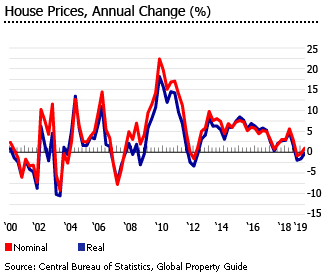
The Southern district saw the biggest house price increase during the year to Q2 2019, with prices rising by 3.62%. Other districts that experienced modest to minimal year-on-year house price rises included the Northern district (2.91%), the Center (2%), Haifa (1.91%), and Tel Aviv (0.17%).
However, Jerusalem recorded a house price decline of 5.55% during the year to Q2 2019, partly offsetting the price increases seen in other districts.
The country’s most expensive residential area is Tel Aviv, where the average price of owner-occupied dwellings was ILS 2,184,600 (US$620,273) in Q2 2019. It was followed by the Center at ILS 1,788,100 (US$507,695) and Jerusalem at ILS 1,783,500 (US$506,389). The North had the cheapest housing in Israel, with an average price of ILS 953,400 (US$270,699).
Israel has experienced dramatic house prices rises in the past decade (2011 excepted), despite domestic political uncertainty, security threats, and the global financial meltdown. Israel’s house prices have risen by 118% (82% in real terms) from 2006 to 2017.
HOUSE PRICES IN ISRAEL, ANNUAL CHANGE (%) |
||
| Year | Nominal | Inflation-adjusted |
| 2008 | 4.10 | -0.48 |
| 2009 | 22.35 | 18.14 |
| 2010 | 17.04 | 14.22 |
| 2011 | 0.04 | -2.40 |
| 2012 | 5.82 | 4.12 |
| 2013 | 7.38 | 5.40 |
| 2014 | 7.21 | 7.42 |
| 2015 | 5.99 | 6.88 |
| 2016 | 4.97 | 5.26 |
| 2017 | 3.04 | 2.73 |
| 2018 | -0.88 | -1.94 |
| Sources: Central Bureau of Statistics, Global Property Guide | ||
The main reason for the surge in house prices until 2017 was a supply shortage, due to low construction volumes. Other factors fueling the house price boom included the central bank’s expansionary monetary policies, and the lack of alternative investment options.
“Real estate accounts for 19% of gross domestic product directly and another 13% indirectly,” says Elli Kraizberg, a professor at Bar-Ilan University. “Real estate accounts for not less than 40% of the public’s total wealth.”
However since summer of 2011 when thousands of Israelis set up protest camps over worsening housing affordability, home prices have been top of the government’s agenda.
- The government, which controls most of Israel’s land, boosted dwelling starts to about 52,800 annually in 2015 to 2018 – the highest since 1997 – to address the supply shortage.
- The Finance Ministry increased purchase taxes and introduced an additional levy on owners of three or more apartments. As a result, investment transactions dropped sharply from 40% of total transactions in early 2015, to 15% recently.
- Since 2015, the government has intensified its sale of land at discounted prices to contractors, who must then sell apartments at below-market prices.
- Israelis who do not own a home may vie for apartments through a lottery system. Since its inception by end-2015, about 59,700 households have won the lottery, but only 18,000 have actually exercised their right to purchase an apartment at a reduced price.
- In July 2017, the government approved a plan to strengthen the country’s long-term rental market, including the introduction of tax breaks to encourage the construction of rental units.
The economy is projected to expand by 3.1% this year, lower than the annual growth rates of 3.3% in 2018, 3.5% in 2017, and 4% in 2016, based on the forecast released by the BOI.
The Bank of Israel kept its benchmark interest rate at 0.25% in August 2019, after a 15-basis point rate hike in November 2018.
Recent history: house price rises cause social protests
During the global crisis Israel enjoyed amazing double-digit house price rises. Tel Aviv housing rose by 41% between Q1 2008 to Q4 2009! Only the Northern district registered a single-digit house price growth of 4.7%. Israel’s average home price rose by 24.2% between Q1 2008 to Q4 2009.
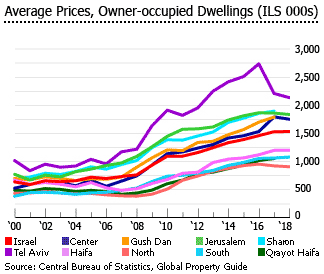
Despite Bank of Israel rate hikes until the key rate reached 3.25% in June 2011, average house prices in Israel rose almost 13% from Q1 2010 to Q2 2011.
One result was a social protest movement, which began in July 2011 with a Facebook group protesting Israel’s rising cost of living (specifically housing costs) as well as the worsening condition of public services.
CHANGES IN AVERAGE PRICE OF DWELLINGS (%) |
|||||||||
| Second intifada (Q3 00-Q2 03) | (Q2 03 -Q1 06) | Israel-Hezbollah War (Q1-Q4 06) | (Q4 06 -Q4 07) | Global econ crisis (Q1 08-Q4 09) | (Q1 10 –Q2 11) | Israeli social justice protests (Q3 11-Q1 12) | (Q2 12 –Q4 17) | 2018 y-o-y | |
| Israel | -6.47 | 28.09 | -11.60 | 4.90 | 24.20 | 12.99 | 0.53 | 31.6 | -0.88 |
| Districts | |||||||||
| Tel Aviv | -16.60 | 25.50 | -12.60 | 22.37 | 41.27 | 8.26 | -3.06 | 40.7 | -2.98 |
| Center | 6.77 | 10.21 | -12.12 | 16.22 | 34.61 | 20.34 | 0.21 | 34.2 | -2.44 |
| Southern | 11.96 | -0.78 | 8.93 | 6.84 | 29.10 | 15.26 | 2.77 | 33.9 | 3.24 |
| Jerusalem | -3.86 | 36.77 | -6.05 | 5.05 | 20.13 | 14.23 | -1.22 | 29.7 | -2.87 |
| Northern | 1.57 | 0.07 | -8.00 | -4.40 | 4.66 | 51.46 | 5.13 | 31.5 | -1.56 |
| Haifa | -10.34 | -0.68 | -10.26 | -8.47 | 29.85 | 23.54 | 9.82 | 35.5 | 0.69 |
| Sources: Central Bureau of Statistics, Global Property Guide | |||||||||
Nationwide house prices rose by a meagre 0.53% from Q3 2011 to Q1 2012, falling in Tel Aviv (-3.06%), Sharon (-2.93%), Gush Dan (-2.26%), and Jerusalem (-1.22%). House prices in the country then rose 31.6% from Q2 2012 to Q4 2017, with all districts registering double-digit increases over the period. Israel’s housing market has been unscathed by the Syrian civil war.
However Israel’s house price boom seems to be over, with government cooling measures intensifying. In 2018, house prices fell in Tel Aviv (-2.98%), Jerusalem (-2.87%), the Center (-2.44%) and the Northern district (-1.56%), resulting to a nationwide house decline of about 0.9%.
Property sales rising again
How long will the decline last?
After three years of falling demand, property sales are now rising sharply again, buoyed by falling mortgage interest rates. In the first seven months of 2019, new dwellings sold soared 40.9% y-o-y to 17,380 units, following declines of 9.9% in 2018, 18% in 2017 and 7.4% in 2016, according to the CBS.
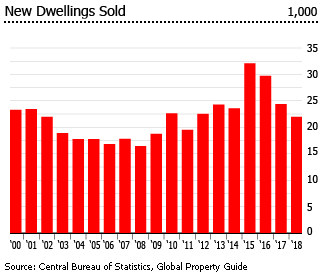
Residential property sales have risen in all districts, except in Judea and Samaria Area.
- In Tel Aviv, new dwellings sold rose by 29.4% y-o-y to 3,730 units during the first seven months of 2019.
- In Jerusalem, new dwellings sold rose by 1.8% y-o-y to 1,134 units over the same period.
- In the Center, new dwellings sold rose by 27.6% y-o-y to 5,383 units.
- In the Northern district, new dwellings sold increased 25.1% y-o-y to 977 units.
- In Southern district, new dwellings sold surged 78.9% y-o-y to 2,388 units.
- In Haifa, new dwellings sold more than doubled to 3,436 units.
- In Judea and Samaria Area, new dwellings sold fell slightly by 0.6% y-o-y to 334 units.
Residential construction activity mixed
While completions have risen, dwelling starts have fallen. Still, current dwelling start totals are way above earlier periods.
Completions were up by 3.9% y-o-y to 50,339 units in 2018, the highest level since 1998. About 27.6% of all completions last year were in the Central district, followed by Tel-Aviv and the Southern district, with 16.7% and 15.6% shares, respectively.
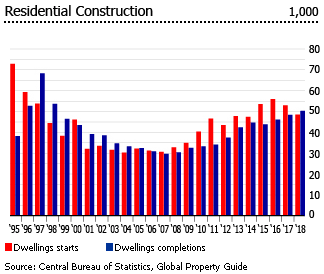
Dwelling starts fell by 8.3% y-o-y to 48,551 units in 2018 – down from an average of about 51,600 units from 2013 to 2017 but still up from 35,000 units annually from 2001 to 2012. Likewise, dwelling permits also dropped 7.3% to 51,586 units in 2018 from a year earlier.
The trend continued this year, with dwelling completions rising by 18.7% y-o-y in Q1 2019 while starts fell by 2.1%, according to the CBS.
Mortgage interest rates falling again; key rate unchanged
In the first seven months of 2019, new mortgages drawn totaled ILS 38.84 billion (US$11 billion), up 11.9% from the same period last year.
That’s because mortgage interest rates in Israel are now falling again, after rising the past two years. In August 2019, the average mortgage interest rate in Israel was 2.81%, down from 3.33% a year earlier and the lowest level since December 2015.
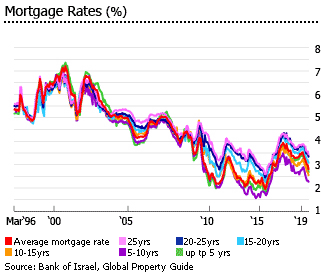
By loan term:
- Up to 5 years: 2.68% in August 2019, down from 3.23% a year earlier
- From 5 to 10 years: 2.27%, down from 2.69% a year earlier
- From 10 to 15 years: 2.55%, down from 3.08% a year ago
- From 15 to 20 years: 3.08%, down from 3.48% a year ago
- From 20 to 25 years: 3.34%, down from 3.71% a year ago
- More than 25 years: 3.41%, down from 3.79% a year earlier
In August 2019, the BOI kept the key rate unchanged at 0.25%, following a surprise 15-basis point rate hike in November 2018, after inflation fell to 0.6% - below the government’s 1% to 3% target.
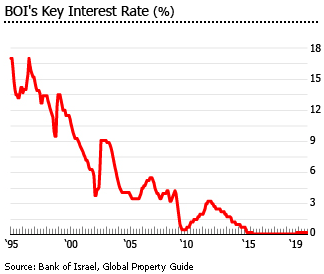
The increase in housing loans unlikely to threaten financial stability
Despite strong growth, Israel’s mortgage market remains fundamentally healthy. The measures of risk inherent in housing debt have risen slightly in recent years, but they are still relatively low compared to other countries, according to the central bank.
“The measures taken in recent years to limit the risks derived from the mortgage market, which is a main factor in the concentration of the credit in the real estate and construction industry, contribute to the financial system's stronger resilience against shocks in this market,” said the BOI in its Financial Stability Report for the first half of 2019.
Banks, which are Israeli households’ main source of financing for purchasing real estate, continue to report a decline in problematic debts.
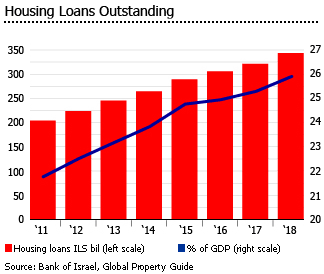
“Very few households are finding it difficult to meet their mortgage payments, apparently due to a combination of a low interest rate environment and a long period of growth characterized by low unemployment rates and persistent growth in the number of employed people and in income levels.”
Israel’s mortgage market has expanded less than expected and was only around 25.9% of GDP in 2019, almost the same ten years ago. This is a modest level of borrowing in a developed country.
Though housing debt constituted more than 65% of total household debt in Q2 2019, households in Israel still have a large surplus of assets over liabilities. In fact, the ratio of household debt to GDP has increased only mildly in recent years and is low by international standards.
This means that the mortgage market remains healthy, despite the continued rise in total housing credit.
Poor yields; modest rent increases
Over the past two decades the country’s homeownership rate has been gradually declining, and more households are renting, due to the shortage of affordable housing. Currently, the homeownership rate is 67.6%, down from 68.8% in 2008 and 73% in 1995.
However gross rental yields on apartments in Tel Aviv are very low, supporting the view that properties are somewhat overpriced. Yields range from 2.6% to 3.1%, based on Global Property Guide research, with smaller apartments having higher yields.
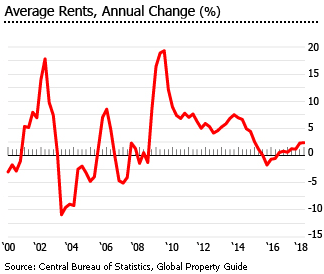
Nationwide rents increased 2.8% in Q2 2019 from a year earlier, to an average of ILS 3,967 (US$1,126) per month, according to the CBS.
By district:
- Tel Aviv has the most expensive rents in the country at an average of ILS5,833 (US$1,656) per month in Q2 2019, up 1.5% from a year ago
- In Jerusalem, the average rent increased 2.1% y-o-y to ILS4,334 (US$1,231) per month in Q2 2019
- In Haifa, the average rent rose by 2.3% y-o-y to ILS2,716 (US$771) per month over the same period
- In Gush Dan, the average rent increased 3.6% y-o-y to ILS4,142 (US$1,176) per month
- In the Center and Jerusalem Periphery Towns, the average rent increased 3.5% y-o-y to ILS3,923 (US$1,114) per month
- In the Southern district, the average monthly rent rose by 4.3% y-o-y to ILS2,940 (US$835)
- In Sharon, the average rent increased slightly by 1.2% y-o-y to ILS4,520 (US$1,283) per month in Q2 2019
- In the Northern district, the average rent rose by 2.8% y-o-y to ILS2,688 (US$763) per month
- In Qrayot Haifa, the average monthly rent rose by 2.2% y-o-y to ILS2,525 (US$717) in Q2 2019
Economy growth slowing; very low unemployment
In the second quarter of 2019, the Israeli economy grew by an annualized rate of just 1%, sharply down from expansions of 4.7% in Q1 2019 and 4.2% in Q4 2018, according to the CBS. The economy is projected to expand by 3.1% this year. But this is lower than the annual growth rates of 3.3% in 2018, 3.5% in 2017, and 4% in 2016, based on the forecast released by the BOI.
Unemployment stood at 3.8% in August 2019, down from 4% a year earlier, according to the CBS. The country’s annual unemployment rate has been generally declining since 2003. Unemployment is expected to fall further to 3.4% in 2019, from 3.5% in 2018 and 4.3% in the previous year, according to the BOI.
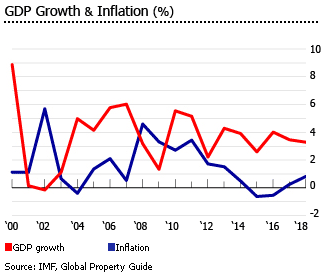
Inflation is expected to be 1.6% this year, up from 1.1% in 2018, 0.2% in 2017, based on the forecast from the BOI.
In 2018, the country recorded a budget deficit equivalent to 1.9% of GDP – the second smallest deficit since 2008. But higher state expenses and lower tax collection have pushed the deficit close to 4% so far this year – far above the initial target of 2.9%. In fact during the first seven months of 2019, the deficit more than doubled to ILS 23.8 billion (US$6.83 billion) compared to a year earlier, according to the Ministry of Finance.
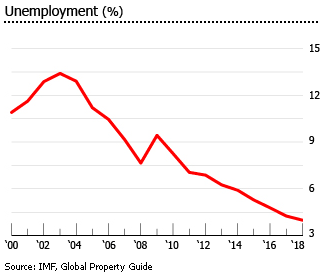
Israel’s public debt was equivalent to 61% of GDP in 2018, the second lowest shortfall ever recorded, according to the BOI. The country’s public debt has been generally falling since 2009.
Israel’s second election in fewer than six months has ended in political deadlock. With no clear winner in the recent general election held last September 17, 2019, both the incumbent prime minister, Benjamin Netanyahu, and his top contender, Benny Gantz, will now set about trying to form a governing coalition. But since both failed to secure a majority of 61 backers, President Reuven Rivlin vowed to do everything to form a national unity government, in an effort to avoid a third election this year.
Sources:
- Average Housing Indices and Prices August 2019 (Central Bureau of Statistics): https://www.cbs.gov.il/en/publications/madad/Pages/2019/Average-Housing-Indices-and-Prices%20-August-2019.aspx
- Construction - Statistical Abstract of Israel 2019 - No.70 (Central Bureau of Statistics): https://www.cbs.gov.il/en/publications/Pages/2019/Construction-Statistical-Abstract-of-Israel-2019-No-70.aspx
- Mortgage Banks - Average Rate of Interest (Bank of Israel): https://www.boi.org.il/en/BankingSupervision/Data/Pages/mortgagee.aspx
- BOI interest rate (Bank of Israel): https://www.boi.org.il/en/DataAndStatistics/Pages/MainPage.aspx?Level=3&Sid=22&SubjectType=2
- Bank of Israel leaves interest rate unchanged at 0.25% (The Jerusalem Post): https://www.jpost.com/Israel-News/Bank-of-Israel-leaves-interest-rate-unchanged-at-025-percent-594975
- Bank of Israel raises rates in surprise first hike since 2011 (Reuters): https://www.reuters.com/article/us-israel-cenbank-rates/bank-of-israel-raises-rates-in-surprise-first-hike-since-2011-idUSKCN1NV24M
- Israel's GDP growth slows to 1 pct in Q2: report (XinhuaNet): http://www.xinhuanet.com/english/2019-08/18/c_138318741.htm
- World Economic Outlook Database (International Monetary Fund): https://www.imf.org/external/pubs/ft/weo/2019/01/weodata/index.aspx
- Debt Developments in the Nonfinancial Private Sector, Second Quarter of 2019 (Bank of Israel): https://www.boi.org.il/en/NewsAndPublications/PressReleases/Pages/22-09-19.aspx
- Financial Stability Report for the first half of 2019 (Bank of Israel): https://www.boi.org.il/en/NewsAndPublications/RegularPublications/Pages/FSR201901h.aspx
- Research Department Staff Forecast, July 2019 (Bank of Israel): https://www.boi.org.il/en/NewsAndPublications/RegularPublications/Pages/forcast0719h.aspx
- Labour Force Survey Data, August of 2019 (Central Bureau of Statistics): https://www.cbs.gov.il/en/mediarelease/pages/2019/labour-force-survey-data-august-2019.aspx
- State budget deficit soars to NIS 14 billion in June (The Times of Israel): https://www.timesofisrael.com/state-budget-deficit-soars-to-nis-14-billion-in-june/
- 'No catastrophe': Israel budget deficit to fall in 2020 – ministry (Reuters): https://www.reuters.com/article/us-israel-economy-interview/no-catastrophe-israel-budget-deficit-to-fall-in-2020-ministry-idUSKCN1VX1Q2
- UPDATE 1-Israel’s finance minister blames higher deficit on tax forecast errors by his own ministry (CNBC): https://www.cnbc.com/2019/09/23/reuters-america-update-1-israels-finance-minister-blames-higher-deficit-on-tax-forecast-errors-by-his-own-ministry.html
- Israeli elections: Arab parties back Gantz to oust Netanyahu (BBC News): https://www.bbc.com/news/world-middle-east-49790505
- Boost for Netanyahu as three Arab politicians refuse to back rival (The Guardian): https://www.theguardian.com/world/2019/sep/23/israel-boost-for-netanyahu-as-three-arab-politicians-refuse-to-back-rival
- Property in Tel Aviv is very expensive, and rental yields are poor (Global Property Guide): https://www.globalpropertyguide.com/Middle-East/Israel/Rental-Yields
- Israeli gov't deficit hits 6.83 bln USD in first 7 months (XinhuaNet): http://www.xinhuanet.com/english/2019-08/07/c_138288709.htm
- Debt and credit (Bank of Israel): https://www.boi.org.il/en/DataAndStatistics/Pages/MainPage.aspx?Level=3&Sid=74&SubjectType=2
- The Budget, Deficit and Debt (Bank of Israel): https://www.boi.org.il/en/DataAndStatistics/Pages/MainPage.aspx?Level=2&Sid=19&SubjectType=2